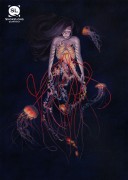In my very first creative writing workshop, I received advice that stuck with me my whole life because I was susceptible and it sounded true. It’s this: No one wants to hear about your dreams. But I wanted to hear about these dreams. Maybe some of us just have better dreams than others? I’m wondering if you think writers should be cautious about including dreams in their work, and why doing so works so nicely here.
That’s funny: my first mentor told me to never begin a story in the dreamy haze of early morning, the protagonist having just woken up and freshly scrubbed to face the world.
His words stuck with me just like with you. And I think my mentor was right (unless the waking up included finding a corpse upended in the walk-in closet).
But “never” include your dreams? Nah. I think it can work. Just don’t let your dreams be obvious symbols, or painful neon signs pointing to something here-come-the-quotation-marks “allusory.” The dream (or dreams) should be mysterious yet unforced, I think.
I get the impression from your writing that you were a kid who really explored nature—reached into hollow trees, probed possible snake holes with a stick. How far off am I?
Not far! (Laughs.) I used to love catching snakes. My brother and I would dig around the unstacked woodpile or within the long rock walk across from our home in central New Hampshire. What we caught we’d toss into an empty kiddie pool in the back yard. They’d slither around atop the dry plastic, and we’d try and get them to bite green plastic toy soldiers we shook in their faces. They usually didn’t oblige. The natural world is important to both me and my writing; it helps me stretch out my mind when I go for a walk, and it still offers tactile surprises in an era of staid social media updates.
I like the numbering of the exhibits, and the suggestive quality of the missing exhibits (2-17, 19-21). I’d be thrilled to read what’s not here, although I’m nearly certain it doesn’t exist. How do you intuit when you’re dealing with a flash fiction versus a longer story?
No, it doesn’t. A piece just announces itself, like the flu, and I understand what it needs to be. I know if it’s gonna be short by the amount of energy I feel. High energy means this is all gonna be over soon. Low and brooding means we’re in it for the long haul.
You achieve a cinematic quality here, and I think it might be helped along by the lush sensory description I see. Are you a movie lover, and if so, what movies or moviemakers most inspire you?
Love movies. Some of my favorites filmmakers include Terrence Malick, Paul Thomas Anderson, Alejandro Gonzalez Inarritu, Alfonso Cuaron, Alfred Hitchcock, Michael Haneke, and Wes Anderson.
I want to ask you if you’re always this creepy, but that seems rude. What made you tell such a creepy story? Is this a common tenor for you? I’d love to see a whole collection of these. You do creepy exceptionally well!
I moved into an old house last summer: it was built 1881 and used to be a “curing house,” which means that people would come up here (we live in the Adirondacks) and try to cure their tuberculosis. They’d literally tie people upright into wooden chairs, wrap a wool blanket around them, and stick them on the porch facing southwest. You’re cured! Anyway, I started thinking about the house’s history, and that it’s probably seen its fair share of tragedy, and the story went off from there. But to answer your question: I’m not always this creepy, but I have my moments. Just ask my wife.



 The core workshop of SmokeLong Fitness is all in writing, so you can take part from anywhere at anytime. We are excited about creating a supportive, consistent and structured environment for flash writers to work on their craft in a community. We are thrilled and proud to say that our workshop participants have won, placed, or been listed in every major flash competition. Community works.
The core workshop of SmokeLong Fitness is all in writing, so you can take part from anywhere at anytime. We are excited about creating a supportive, consistent and structured environment for flash writers to work on their craft in a community. We are thrilled and proud to say that our workshop participants have won, placed, or been listed in every major flash competition. Community works.